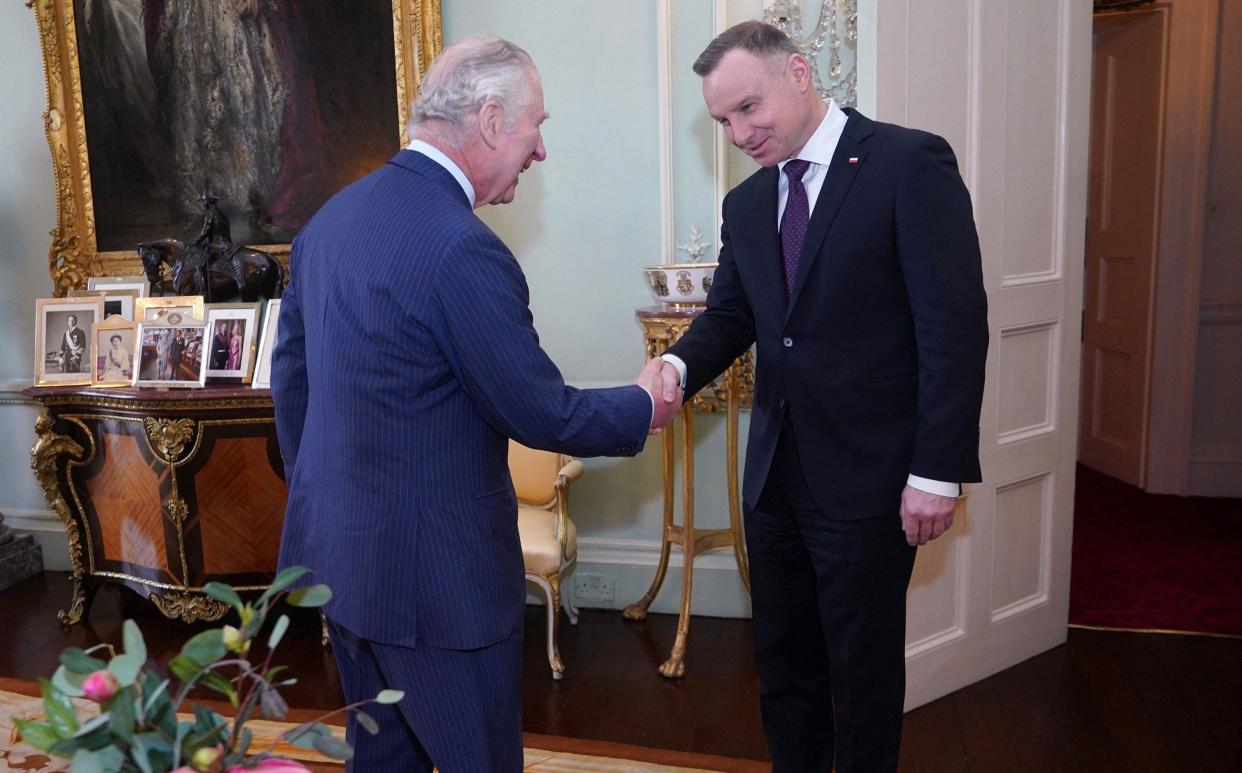Poland is now the new Great Power of Europe

- Oops!Something went wrong.Please try again later.
The grand ceremonial welcome Germany afforded the King and Queen when they arrived in Berlin yesterday was designed to demonstrate that, despite all the friction caused by Brexit, the Germans still value Britain as an important ally. From providing an escort of German Eurofighter Typhoons for the RAF Voyager carrying the royal party to the 21-gun salute and flypast when the couple landed at Berlin’s Willy Brandt airport, the German authorities went out of their way to show their respect and appreciation for the royal visitors.
Initially, the King’s first state visit since becoming monarch was supposed to include both France and Germany, widely seen as a charm offensive designed to underscore Rishi Sunak’s efforts to rebuild relations with Europe’s major powers post-Brexit. The French leg, of course, had to be postponed because of the nationwide rioting provoked by President Emmanuel Macron’s pension reforms. So it was left to the Germans to demonstrate that the major European powers continue to hold Britain and its royal family in high esteem.
But while the Germans have clearly gone out of their way to make the King, a German-speaker who is said to “cherish” his own German ancestry, feel at home, it is questionable whether, as Britain seeks to rebuild its ties with Europe, Germany and France will in the future still deserve to be the focus of our diplomatic effort.
It is not just that both Berlin and Paris have gone out of their way to exploit Britain’s exit from the European Union to their advantage, such as sidelining the City of London as the continent’s financial hub or doing very little to stop the Channel boat crossings.
It is the more alarming reality that, on all the big global issues of the day, from the Ukraine conflict to China, Germany and France invariably find themselves on the wrong side of history. Now, they no longer engender the respect they previously enjoyed when the likes of Helmut Kohl and François Mitterrand strode the European stage.
These days, if you want to engage with European countries that fully comprehend the challenges we face, Britain’s interests would be far better served by expanding ties with Poland and Slovakia.
While Berlin and Paris remain conflicted about how best to help the Ukrainian cause, Warsaw and Bratislava have been forthright in their support for Kyiv in its desperate fight against Russian aggression.
Their geographical proximity to the Russian border does provide them with an acute understanding of the threat that Vladimir Putin’s revanchist ambitions pose to European security. They have been unstinting in their backing for the Ukrainian cause, to the extent that, while other European capitals have resisted Kyiv’s appeals for heavy armour and warplanes, Poland and Slovakia have shown no qualms about sending their fighter jets to assist Ukraine’s war effort.
If the dozen or so Russian-made MiG-29 fighters they are supplying are modest compared with the billions of dollars of weapons being donated by the US and other allies, their gesture nevertheless underscores a vital point for the West: if Ukraine is to prevail on the battlefield, then the Western powers must give the country the weapons it requires to be an effective fighting force.
Thanks to the Biden administration’s constant equivocation on the Ukraine issue, many Western leaders find themselves in the uncomfortable position of supporting a policy whereby Russia loses the war, but Ukraine does not win. This has led to a marked reluctance by the likes of Germany and France to give Kyiv the help it needs to inflict a comprehensive defeat on Moscow.
The hesitancy of these hitherto major European powers to support Ukraine, together with their decidedly ambivalent attitude towards the emerging threat posed by China, means that as Europe prepares for the challenges that lie ahead a new centre of gravity is emerging within the Western alliance – one where Central European countries like Poland are more willing to assume a leadership role at the expense of traditional powers such as the French and Germans.
The decision by Sweden and Finland to forswear their long-standing neutrality in favour of Nato membership – a direct response to Russian aggression against Ukraine – supports this trend, together with the contribution of the Baltic states. They, too, are under no illusions about the scale of the threat Russia and other rogue states pose to Europe’s security.
The move to give Nato more backbone would be significantly strengthened if Ukraine were ever to be granted full membership of the alliance, an issue that should no longer be avoided for fear of upsetting Moscow. Having allowed 13 Central and Eastern European states – despite Russian objections – to join Nato following the end of the Cold War, there will be no justification for denying Ukraine entry, especially if, against the odds, Kyiv succeeds in defeating its Russian foe.

